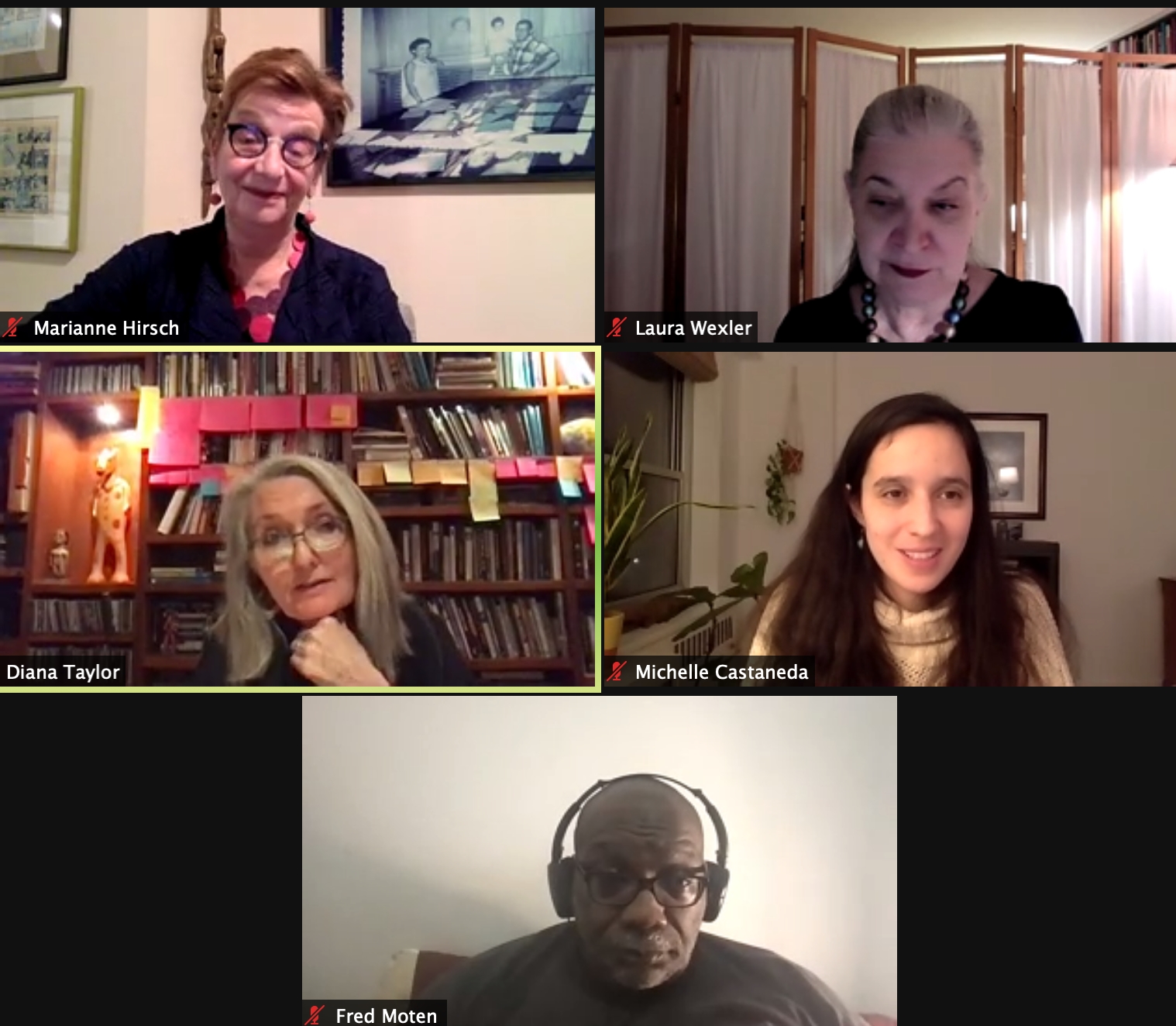On Friday, February 19, 2021, the Department of Performance Studies came together to celebrate the book launch of Professor Diana Taylor’s new book ¡Presente! The Politics of Presence. This event included a conversation with panelists Fred Moten (NYU), Michelle S Castaneda (NYU), Anna Deavere Smith (NYU), Marianne Hirsch (Columbia), and Laura Wexler (Yale) who came together to discuss their favorite parts from ¡Presente! and to explore the many important topics Taylor discusses in her book.
Diana Taylor is a Professor of Performance Studies at NYU and the founder and former Director of the Hemispheric Institute of Performance and Politics. ¡Presente! is a culmination of Taylor’s many years of working in Performance Studies and moving through the Americas thinking about how to intervene through the very brutal struggles people have had for hundreds of years. In ¡Presente! Diana Taylor asks what it means to be physically and politically present in situations where it seems that nothing can be done. As much an act, a word, an attitude, a theoretical intervention, and a performance pedagogy, Taylor maps ¡Presente! at work in scenarios ranging from conquest, through colonial enactments and resistance movements, to present moments of capitalist extractivism and forced migration in the Americas. ¡Presente!—present among, with, and to; a walking and talking with others; an ontological and epistemic reflection on presence and subjectivity as participatory and relational, founded on mutual recognition—requires rethinking and unlearning in ways that challenge colonial epistemologies. Showing how knowledge is not something to be harvested but a process of being, knowing, and acting with others, Taylor models a way for scholarship to be present in political struggles.
Comments on ¡Presente! from Panelists
Michelle Castaneda
Professor Michelle Castaneda introduced Diana Taylor’s book as an exploration of the politics of life fought from a place of death. The importance of fighting for a future, even when those who fought may never see it, was highlighted in passages of the book read out loud by Professor Castaneda. She tells us that the book is an invitation into a journey of being witness to the struggles of others. We can offer one thing in complete abundance; our presence.
Marianne Hirsch
Hineni, Hebrew for “here I am”, is the answer when God calls. Hirsch describes examples of when Hineni is invoked, and how it relates to the idea of being present for others in a time of need. She says “¡Presente! reflects a lifetime of learning, of thinking, of being, and walking with others”. Hirsch spoke of the awareness of the body being in the present moment. However, Presente is more than that- it is the repetition of structures that have existed throughout time, spiralling forward, overlapping, and competing with one another. She marks para-time as being next to, and using paratemporalities as a mode of opening up new possibilities to make communities visible.
Anna Deavere Smith
Anna Deavere Smith shared what it means to walk with another as a way of being present and holding space. Walking becomes another way to be ‘here’, adding yet another offering to the community at large. Taylor is a walker, one who walks with others in times of great need, she mentions. The presence of the actor is a surrender to the community, and Smith uses this analogy to describe how the book surrenders its stories to the world.
Laura Wexler
“Presente” is used as an honorific for those who have died. It is also a quotidian act of announcing one’s presence. Taylor’s book adds to this notion of being present even past one’s life, and she holds out her hand for others, making sure to answer each and every call.
Fred Moten
Fred Moten explored the pedagogy of stones in Chapter 3 of Taylor’s book. The exercise of creating a tower of stones as a group represents how we become the structure we try to build. The stones we use are brought into an animating social existence, as part of the social and political landscape. Moten went on to speak about the use of the exclamation points in ¡Presente!, and how the inclusions of the bilinguality in the title reference the complex presence of communities in different spaces. The duality of existing within and between communities can help create a broad understanding of the care required to build social structures.
Diana Taylor
One of the hardest things about writing a book is writing for certain people, it has many life cycles- in publication, then out into the world. The book is an animated force of mourning, it is the culmination of the work, but it is also an opening for a different kind of work to be done. Taylor is eager for what comes next, and she stresses the obligation she had to bring this book out into the world. She carried these stories, and is now passing them onwards in these pages, hoping the larger community will keep engaging with ¡Presente! It is a call to action, to refuse the accommodations to injustice.
Thank you to everyone who joined us for the ¡Presente! Book Launch Event! We want to give a special thanks to panelists Michelle Castañeda, Anna Deavere Smith, Marianne Hirsch, Fred Moten, and Laura Wexler for leading a wonderful discussion about Taylor’s new book and we want to congratulate Diana Taylor on the release of ¡Presente! The Politics of Presence.
You can download the first chapter of ¡Presente! free and purchase the entire book from Duke University Press: https://www.dukeupress.edu/presente
Story by Aarlene Vielot and Shivani Joshi

